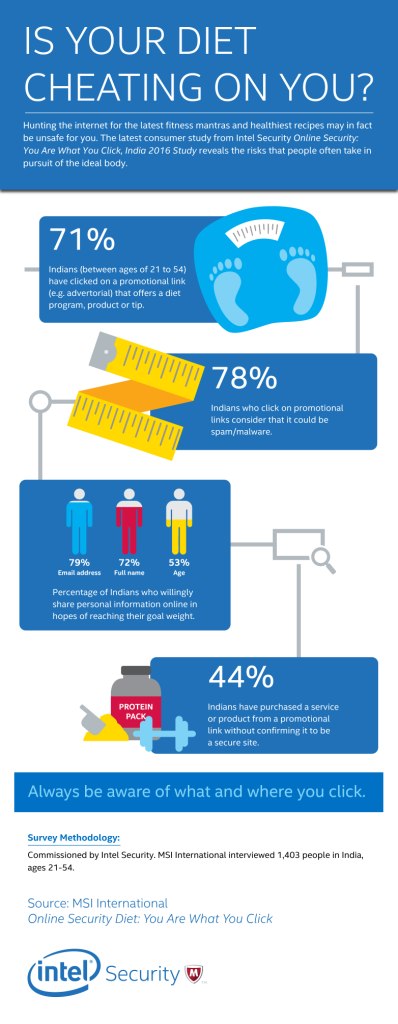 New Study Reveals Security Risks associated with Dieting Clickbait
New Study Reveals Security Risks associated with Dieting Clickbait
- Intel Security conducted a study to understand consumer behaviours when searching online for diet and fitness programs, and to help educate them about potential risks.
- The study highlights various ways cybercriminals take advantage of the public’s interest in dieting programs, and focuses on what behaviours consumers engage in that may open them up to online security dangers.
India – June 28, 2016 – Intel Security today released findings from its new study, “Online Security Diet: You Are What You Click,” which examines the online behaviors and attitudes of Indians ages 21 to 54 toward dieting clickbait. The research reveals that when it comes to the desire for the ideal body, people may be willing to sacrifice their online security and identity if it takes them a step closer to achieving desired results.
The survey indicates that youngsters between the age group of 21-30 years are more likely (77%) to click on promotional links around diet tips and programs. While the month of June brings about a pleasant weather with commencement of rains in India, it also necessitates the need to maintain a healthy diet to stave off the many diseases that monsoon brings along with it. During the rains, people abstain from eating food that’s cooked outside, making June a popular month to turn up online in search of new diet routines. Cybercriminals exploit this need by creating phony weight loss ads leading unsuspecting people into digital traps.
“Findings from our study indicate that Indian millennials (aged 20-30) are conscious about their diet, and they tend to rely on information available online for quick diet fixes, and cybercriminals are increasingly exploiting this behavior for their own benefit.” said Venkat Krishnapur, Head of Operations for Intel Security’s India Engineering Centre. “The study decodes the seasonality of consumer search habits, creating awareness about the importance of safe searches online. It points to the importance of being able to correctly identify potentially risky sites and emails. This is why we continue to invest in ongoing education efforts to reinforce strong habits helping consumers enjoy safer experiences online.”
 Study highlights include:
Study highlights include:
Dieting Promotions: Too Good to be True?
- Over two thirds of the survey respondents (71 percent) between ages 21-54 clicked on a promotional link that offers a diet program
- This figure rises to 77 percent for respondents within the age group of 21-30 years
- 70 percent of respondents are more likely to click on a promotional link or an article offering dietary tips featuring or endorsed by a celebrity
Think Before You Click
- A vast majority of the people (78 percent) that click on link for diet programs/ tips/ products did consider that it could be spam/malware
- That said, 44 percent of survey respondents have purchased a service or product from a promotional link without knowing whether or not it’s a secure site
- Respondents were most likely to click on a promotional link for diet programs/ products/tips generated by a Google* search (68 percent), with others reporting they would click links featured on Facebook* (67 percent), email (47 percent), or a website (44 percent)
Beware of What You Share
- Many respondents reported their willingness to share information like email address (79 percent), full name (72 percent) or age (53 percent) with a website, service or company in hopes of reaching their goal weight or dream body
- A significant number of respondents indicated that they would also share their home address (28 percent), credit/debit card details (13 percent), or even a photo in underwear/bathing suit (e.g. before/after shots) (6 percent)
- Yet one out of four respondents (25 percent) admitted that they didn’t know how to check if the website was secure before providing payment details or personal information
How You Can Better Protect Yourself to Avoid Online Diet Scams:
- Click with caution.Offers from sites that seem too good to be true, such as “Lose 5 Kgs. in one week,” may indicate that a site should be viewed with caution. Websites or emails might include phishing links that can lead you to websites that lure you into giving personal information to cybercriminals or download malware to your computer
- Browse safely.Beware of phony websites. Sites aimed at scamming consumers may have an address very similar to a legitimate site, like “Wait Watchers” opposed to “Weight Watchers.” Phony sites often have misspellings, poor grammar or low-resolution images. If a site asks for personal information, double check the URL, and make sure it’s the site you intended to visit and not an imposter. Use a web reputation tool such as McAfee WebAdvisor that can help identify risky sites and inform you that you may be about to visit one
- Develop strong passwords.Do away with the “123321” password, and use a strong one, like “9&4yiw2pyqx#.” Regularly change passwords and don’t use the same passwords across all your accounts. As a way to improve the quality of your passwords, consider using a password manager
- Stay up to date.The best security software updates automatically to protect your computer. Use the manufacturer’s latest operating systems and allow security patches to be updated on an ongoing basis. Also ensure you have the appropriate software set to conduct routine scans
- Use a comprehensive security solution.Protecting all your devices with a comprehensive security solution, like McAfee LiveSafe, can help shield you from malware and other cyberattacks
Study Methodology
The research was conducted in April 2016 by MSI International via an online questionnaire to 1,403 people in India, age 21-54. The study had 15,000 consumers participating in the study globally.
About Intel Security
Intel Security, with its McAfee product line, is dedicated to making the digital world safer and more secure for everyone. Intel Security is a division of Intel Corporation. Learn more at www.intelsecurity.com.
